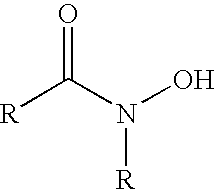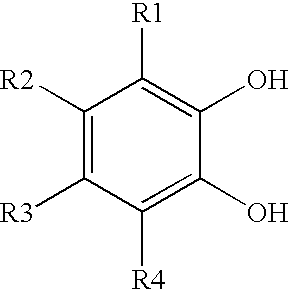Composition of matter comprising polymer and derivatized nanoparticles
a technology of derivatization and nanoparticles, which is applied in the direction of transportation and packaging, biocide, and other chemical processes, can solve the problems of release of chemicals that are harmful to the user of said items, metals that are toxic to living systems, and organisms that may experience disease or illness, etc., to achieve efficient removal of metal ions, high metal-ion capacity, and convenient application
- Summary
- Abstract
- Description
- Claims
- Application Information
AI Technical Summary
Benefits of technology
Problems solved by technology
Method used
Image
Examples
examples
(1-4) and Comparison Examples C-1
[0057]A “model” biological liquid medium was prepared as follows: 12.5 g of sucrose, 12.5 g of glucose, 0.25 g of NaCl and 0.125 g of citric acid, and 2.0 ml of a 500 ppm solution of Fe3+ were carefully dissolved in 498.0 ml of pure distilled water to produce a solution having: 5% sucrose, 5% glucose, 1000 ppm NaCl, 500 ppm citric acid and 2 ppm iron. 5 cm×5 cm pieces of the coatings prepared as described above were then contacted with 25.0 ml of the model biological liquid medium. The pieces of the coatings were left in contact with the medium for the time indicated in Table 2, and a 1.0 ml aliquot of the medium was taken for Fe analysis via inductively coupled plasma-atomic emission spectroscopy. A Comparison example was prepared using a 5 cm×5 cm piece of the polymeric support which did not contain a coating of the inventive composition. The data are given in Table 2.
[0058]
TABLE 2Example orConcentrationConcentrationComparisoncoating(ppm) Fe(ppm) F...
PUM
| Property | Measurement | Unit |
|---|---|---|
| particle size | aaaaa | aaaaa |
| thickness | aaaaa | aaaaa |
| particle size | aaaaa | aaaaa |
Abstract
Description
Claims
Application Information
 Login to View More
Login to View More - R&D
- Intellectual Property
- Life Sciences
- Materials
- Tech Scout
- Unparalleled Data Quality
- Higher Quality Content
- 60% Fewer Hallucinations
Browse by: Latest US Patents, China's latest patents, Technical Efficacy Thesaurus, Application Domain, Technology Topic, Popular Technical Reports.
© 2025 PatSnap. All rights reserved.Legal|Privacy policy|Modern Slavery Act Transparency Statement|Sitemap|About US| Contact US: help@patsnap.com


